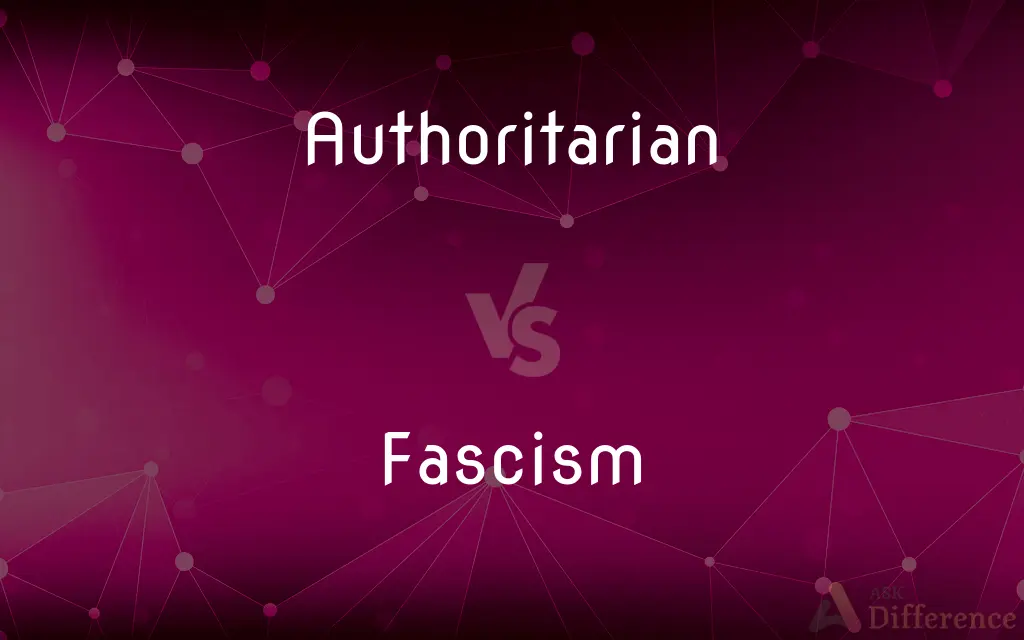Authoritarian vs. Fascism — What's the Difference?
By Tayyaba Rehman — Published on November 4, 2023
Authoritarian denotes centralized power and limited political freedoms; Fascism is a far-right ideology with dictatorial power and strong nationalism.

Difference Between Authoritarian and Fascism
Table of Contents
ADVERTISEMENT
Key Differences
Authoritarianism is a political system in which power is highly centralized, often resting with a single entity or a small group. This concentration of power often leads to limited political freedoms and civil liberties. The central authority in an authoritarian system may or may not be aligned with specific ideologies but primarily seeks to maintain and consolidate power.
Fascism, on the other hand, is a specific far-right ideology and political system that emerged in the early 20th century, primarily in Italy under Benito Mussolini. While it shares the centralized power characteristics of authoritarianism, fascism emphasizes strong nationalism, often coupled with a sense of racial purity, and seeks to create a harmonized society by suppressing perceived enemies and dissent.
While both authoritarian and fascist systems prioritize centralized power and limited individual freedoms, authoritarianism is broader in scope and can exist outside of specific ideological frameworks. In contrast, fascism is deeply ideological, merging ideas of nationalistic pride, often with notions of racial or cultural superiority.
Another distinguishing feature is the relationship with tradition and the past. While authoritarian regimes might be indifferent to or even break from traditional values in their quest for power, fascist regimes typically romanticize the past, aiming to restore a perceived golden age.
Lastly, while both systems might employ propaganda to further their goals, the propaganda in fascist systems is often rooted in notions of national and racial identity. Authoritarian systems, regardless of their ideology, use propaganda primarily as a tool to maintain power and control.
ADVERTISEMENT
Comparison Chart
Primary Focus
Centralized power
Far-right ideology, nationalism
Ideological Basis
Can be varied or none
Specific, with emphasis on national and racial purity
Representation
Power often with a single entity or small group
Dictatorial power with strong centralized leadership
Approach to Tradition
May or may not uphold traditions
Often romanticizes and aims to restore a perceived past
Usage in Propaganda
To maintain control
To promote national/racial identity and suppress dissent
Compare with Definitions
Authoritarian
It limits political freedoms and individual liberties.
Under the authoritarian rule, media censorship became prevalent.
Fascism
It emphasizes dictatorial power and strong nationalism.
Fascism promotes a unified national identity at the expense of minorities.
Authoritarian
Authoritarianism signifies a system with centralized power.
The country shifted towards an authoritarian regime after the coup.
Fascism
Fascism is a far-right political ideology.
Mussolini's Italy was a prime example of fascism.
Authoritarian
Authoritarian leadership can exist in various political systems.
Some monarchies have displayed authoritarian tendencies over the years.
Fascism
A system of government marked by centralization of authority under a dictator, a capitalist economy subject to stringent governmental controls, violent suppression of the opposition, and typically a policy of belligerent nationalism and racism.
Authoritarian
Authoritarian systems prioritize stability and control.
The authoritarian leader suppressed protests to maintain stability.
Fascism
A political philosophy or movement based on or advocating such a system of government.
Authoritarian
It emphasizes obedience to authority over personal freedom.
The authoritarian government mandated curfews and restricted gatherings.
Fascism
Oppressive, dictatorial control.
Authoritarian
Characterized by or favoring absolute obedience to authority, as against individual freedom
An authoritarian regime.
Fascism
Any right-wing, authoritarian, nationalist ideology characterized by centralized, totalitarian governance, strong regimentation of the economy and society, and repression of criticism or opposition.
Authoritarian
Tending to tell other people what to do in a peremptory or arrogant manner.
Fascism
Any system of strong autocracy or oligarchy usually to the extent of bending and breaking the law, race-baiting, and/or violence against largely unarmed populations.
Authoritarian
Of, or relating to, or exhibiting strict obedience to an authority; favoring authoritarianism over civic and individual liberties.
The authoritarian personality
Fascism
Any extreme reliance on or enforcement of rules and regulations.
Authoritarian
Demanding obedience to authority; marked by authoritarianism; dictatorial, tyrannical.
The authoritarian government was demanding stricter laws for low-wage peasants.
Fascism
A political theory advocating an authoritarian hierarchical government; - opposed to democracy and liberalism.
Authoritarian
Tending to impose one's demands upon others as if one were an authority.
Fascism
An authoritarian system of government under absolute control of a single dictator, allowing no political opposition, forcibly suppressing dissent, and rigidly controlling most industrial and economic activities. Such regimes usually try to achieve popularity by a strongly nationalistic appeal, often mixed with racism.
Authoritarian
One who commands absolute obedience to his or her authority.
The dictator was an authoritarian.
Fascism
Specifically, the Fascist movement led by Benito Mussolini in Italy from 1922 to 1943.
Authoritarian
One who follows and is excessively obedient to authority.
Fascism
Broadly, a tendency toward or support of a strongly authoritarian or dictatorial control of government or other organizations; - often used pejoratively in this sense.
Authoritarian
Characteristic of an absolute ruler or absolute rule; having absolute sovereignty; - of governments or rulers; as, an authoritarian regime
Fascism
A political theory advocating an authoritarian hierarchical government (as opposed to democracy or liberalism)
Authoritarian
Expecting unquestioning obedience: "he was imperious and dictatorial"; "the timid child of authoritarian parents"; "insufferably overbearing behavior toward the waiter"
Fascism
Fascist regimes often uphold notions of racial or cultural superiority.
Under fascism, certain groups faced persecution due to perceived racial inferiority.
Authoritarian
Behaves like a tyrant.
Fascism
It seeks societal harmony by suppressing dissent and perceived enemies.
Fascism silenced opposition voices to present a façade of unity.
Authoritarian
A person behaves in an tyrannical manner;
My boss is a dictator who makes everyone work overtime
Fascism
Fascism romanticizes the past, aiming for a perceived golden age.
Fascism often looks back at history with rose-tinted glasses, seeking restoration.
Authoritarian
Characteristic of an absolute ruler or absolute rule; having absolute sovereignty;
An authoritarian regime
Autocratic government
Despotic rulers
A dictatorial rule that lasted for the duration of the war
A tyrannical government
Authoritarian
Likened to a dictator in severity
Authoritarian
Expecting unquestioning obedience;
He was imperious and dictatorial
The timid child of authoritarian parents
Insufferably overbearing behavior toward the waiter
Common Curiosities
Where did fascism originate?
Fascism originated in Italy in the early 20th century under Benito Mussolini.
Is every authoritarian regime fascist?
No, while all fascist regimes are authoritarian, not all authoritarian regimes are fascist.
What's the key characteristic of authoritarianism?
Authoritarianism is marked by centralized power and limited political freedoms.
Can democracies exhibit authoritarian tendencies?
Yes, democracies can display authoritarian tendencies, especially if power becomes overly centralized.
Is fascism always authoritarian?
Yes, fascism is a subset of authoritarianism with specific far-right ideological tenets.
How do both systems view individual freedoms?
Both systems limit individual freedoms, prioritizing state control and stability.
How do fascist regimes treat minorities?
Fascist regimes often marginalize or persecute minorities based on national or racial purity ideals.
Can authoritarian systems be left-leaning?
Yes, authoritarianism can exist on both the left and right of the political spectrum.
Can authoritarian systems exist without a strong leader?
Typically, authoritarian systems have a strong central authority, but it might not always be a single individual.
What role does propaganda play in both systems?
Both use propaganda, but while authoritarianism uses it for control, fascism uses it to promote national/racial identity.
How are the terms authoritarian and fascist misused in popular discourse?
They're sometimes used interchangeably or as general pejoratives, without acknowledging their specific characteristics.
Why do fascist regimes romanticize the past?
They aim to restore a perceived golden age, often tied to nationalistic pride.
How do authoritarian leaders maintain power?
They often suppress dissent, control media, and limit political freedoms.
What's the relationship between nationalism and fascism?
Nationalism is a core tenet of fascism, emphasizing a unified national identity.
Can countries transition from authoritarianism or fascism to democracy?
Yes, historical examples like Spain and Portugal show transitions from authoritarian/fascist regimes to democracies.
Share Your Discovery

Previous Comparison
Induced Dipole vs. Permanent Dipole
Next Comparison
DLC vs. Expansion PacksAuthor Spotlight
Written by
Tayyaba RehmanTayyaba Rehman is a distinguished writer, currently serving as a primary contributor to askdifference.com. As a researcher in semantics and etymology, Tayyaba's passion for the complexity of languages and their distinctions has found a perfect home on the platform. Tayyaba delves into the intricacies of language, distinguishing between commonly confused words and phrases, thereby providing clarity for readers worldwide.












































